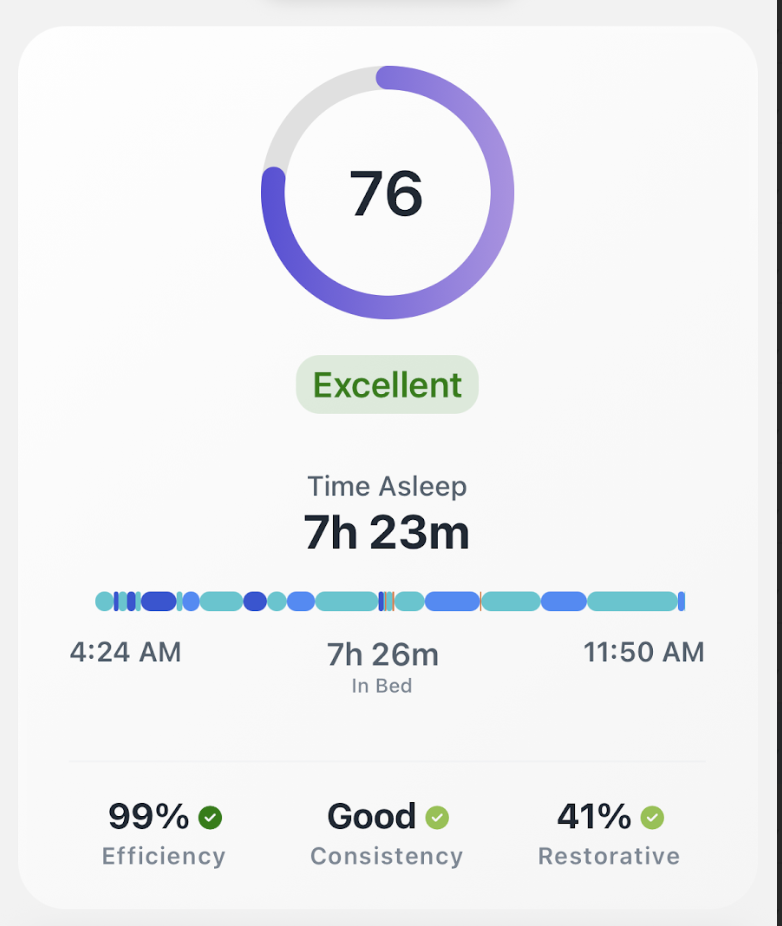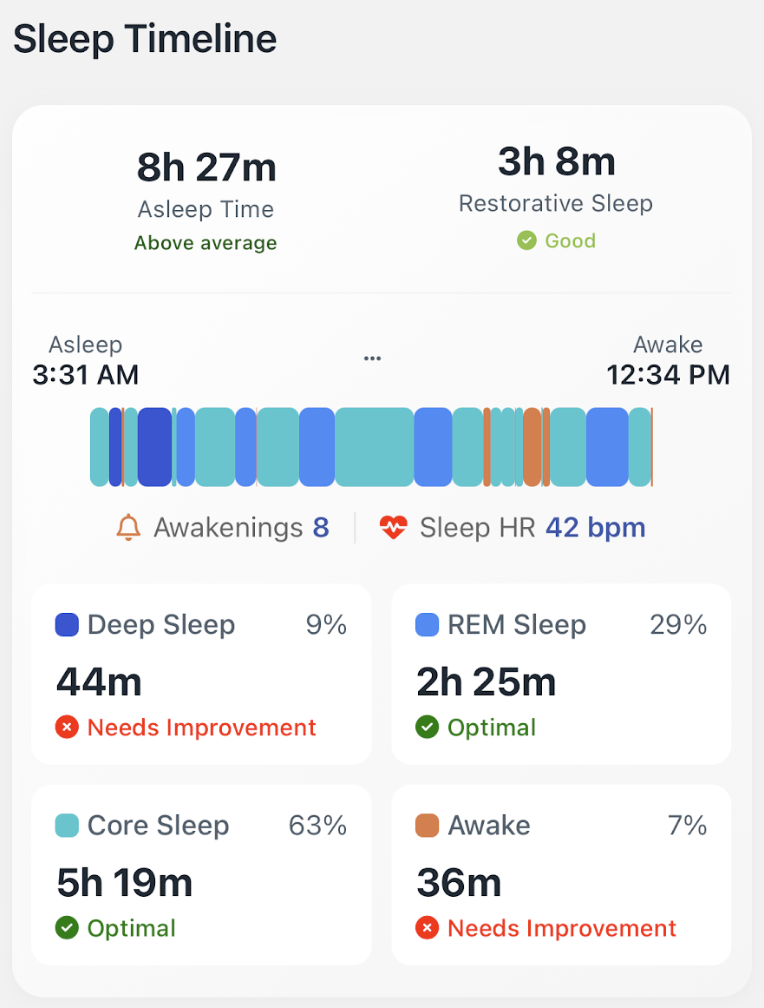Getting a full night’s sleep isn’t just about logging eight hours in bed. The quality of your sleep, specifically, how restorative it is, determines whether you wake up energized and ready to tackle your day or groggy and sluggish.
What is Restorative Sleep?
Restorative sleep refers to the quality sleep that allows your body and mind to recover, repair, and rejuvenate. During restorative sleep, your body performs essential functions including muscle recovery, memory consolidation, hormone regulation, and immune system strengthening. It’s not just about the total time you spend sleeping, but how effectively your body moves through the critical sleep stages.
Mainly, restorative sleep comes from deep sleep and REM sleep combined. For optimal recovery, you should aim for a total restorative sleep percentage of 30-50% of your total sleep time, with at least 10% coming from deep sleep and 20-25% from REM sleep.

The Four Stages of Sleep and Restoration
Your sleep cycle consists of four distinct stages, each playing an important role in restoration:
Light Sleep (Transition)
This is the drowsy transition between wakefulness and sleep. While not particularly restorative on its own, it’s the gateway to deeper, more rejuvenating sleep stages.
The Apple Watch will generally categorize this as Core Sleep.
Core Sleep
Making up about 45-50% of your total sleep time, core sleep is when your body temperature drops, heart rate slows, and your brain begins to process the day’s information. This stage provides foundational rest and recovery.
Deep Sleep
Often called slow-wave sleep, deep sleep is the most physically restorative stage. During this phase, your body releases growth hormone, repairs tissues, strengthens your immune system, and consolidates memories. Adults typically need 15-20% of their sleep to be deep sleep for optimal restoration.
REM Sleep
REM (Rapid Eye Movement) sleep is crucial for mental restoration, emotional processing, and memory consolidation. This stage supports cognitive function, creativity, and emotional regulation. Healthy adults should spend about 20-25% of their sleep in REM.

Why Sleep Quality Matters More Than Quantity
While sleep duration is important, research consistently shows that sleep quality has a more significant impact on how you feel and function. You can sleep for nine hours but still wake up exhausted if that sleep wasn’t restorative. Factors that impact sleep quality include:
- Sleep fragmentation: Frequent awakenings prevent you from cycling through the restorative stages properly
- Stage distribution: Not getting enough deep sleep or REM sleep limits recovery
- Sleep timing consistency: Irregular sleep schedules disrupt your circadian rhythm
- Environmental factors: Temperature, light, and noise can prevent truly restorative sleep
How Zolt Comprehensively Tracks Restorative Sleep
Zolt goes beyond basic sleep tracking to give you a complete picture of your sleep quality and restoration. Here’s how Zolt helps you understand and optimize your restorative sleep:
Daily Sleep Score
Zolt’s sleep score uses a consistent 0-100 scale that makes it easy to understand your sleep quality at a glance:
- 75-100: Excellent restorative sleep
- 50-75: Good sleep quality
- 25-50: Fair sleep that may need improvement
- 0-25: Poor sleep requiring attention
This score considers multiple factors including sleep duration, stage distribution, sleep efficiency, and consistency.
Detailed Sleep Stage Breakdowns
Zolt provides comprehensive analysis of how much time you spent in each sleep stage, along with ratings that tell you whether your stage distribution supports optimal restoration. You’ll see exactly how much deep sleep and REM sleep you got, with explanations of what these numbers mean for your recovery.
Sleep Continuity and Disruption Analysis
Zolt tracks your awakenings throughout the night and measures sleep continuity. Frequent disruptions can significantly impact the restorative quality of your sleep, even if your total sleep time looks adequate.
Sleep Heart Rate Monitoring
Your heart rate during sleep provides valuable insights into sleep quality and recovery. Zolt monitors your sleep heart rate and provides ratings to help you understand whether your cardiovascular system is getting the rest it needs.
Heart Rate Variability (HRV) During Sleep
HRV is a powerful indicator of recovery and stress. Zolt tracks your HRV during sleep to assess how well your nervous system is recovering and whether your sleep is truly restorative.
Sleep Consistency Tracking
Zolt monitors your sleep timing patterns and consistency, which directly impacts sleep quality. Consistent sleep and wake times support your circadian rhythm and improve the restorative quality of your sleep.
Sleep Trends and Patterns
Beyond individual nights, Zolt identifies longer-term sleep patterns and trends. This helps you understand how factors like stress, activity levels, and lifestyle choices impact your restorative sleep over time.
Optimizing Your Restorative Sleep
Understanding your sleep data is just the first step. Here are evidence-based strategies to improve your restorative sleep:
Maintain consistent sleep timing by going to bed and waking up at the same time every day, even on weekends. This consistency strengthens your circadian rhythm and improves sleep quality. Create an optimal sleep environment by keeping your bedroom cool (65-68°F), dark, and quiet. Consider blackout curtains, white noise, or earplugs if needed.
Use Zolt’s recovery score to understand when you need more sleep or rest. High-quality sleep is especially important during periods of increased training or stress. Pay attention to how factors like caffeine intake, evening screen time, meal timing, and stress levels affect your sleep quality scores in Zolt.
Finally, prioritize good sleep hygiene by establishing a relaxing bedtime routine, avoiding caffeine late in the day, and limiting screen exposure before bed to support natural melatonin production.
Use Zolt to track your sleep
Most sleep trackers tell you how long you slept and maybe break down your sleep stages. Zolt goes much deeper, providing the context and insights you need to understand whether your sleep is truly restorative. By combining sleep data with activity, recovery, and overall energy metrics, Zolt helps you see the complete picture of how your sleep impacts your daily energy and long-term health goals.
Whether you’re trying to optimize athletic performance, manage your weight with Zolt’s dynamic TDEE algorithm, or simply feel more energetic throughout your day, understanding and improving your restorative sleep is fundamental. Research demonstrates that interventions targeting sleep quality can improve both subjective sleep quality and autonomic nervous system function, supporting better recovery and energy levels.
You can download Zolt here.
